A wide-ranging night of African-American music served up with fire and feeling by the Harry T. Burleigh Society
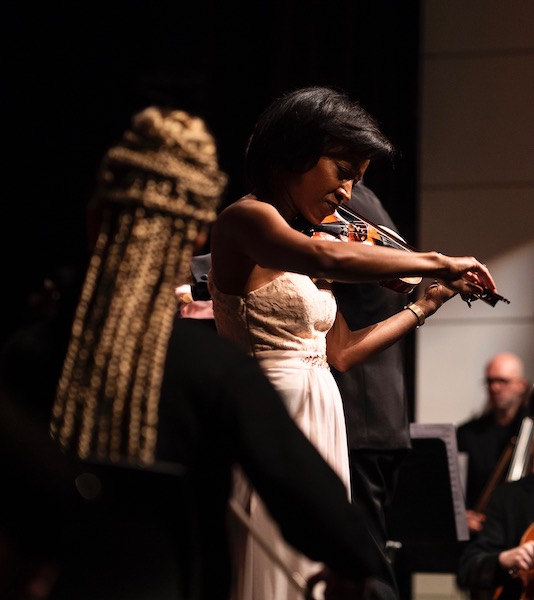
Kelly Hall-Tompkins performed Florence Price’s Violin Concerto No. 2 with the Urban Playground Chamber Orchestra Wednesday night at the NYPL Langston Hughes Auditorium. Photo: Richard Burrowes
To most classical music fans, the name Harry T. Burleigh is just a footnote in music history. But it’s a pretty big footnote.
As a student of Antonín Dvořák in New York in the 1890s, the African-American singer and composer is credited with introducing the Czech master to the “Negro” spirituals that helped shape his most popular work, the Symphony No. 9, “From the New World.”
Wednesday night, the compact stage of Langston Hughes Auditorium at the New York Public Library’s Schomburg Center for Research in Black Culture overflowed with orchestra musicians and choral singers, bent on demonstrating Burleigh’s influence not only on Dvořák but subsequent generations of composers.
A trio of scholars, including two founders of the Harry T. Burleigh Society (established 2017), was on hand to interpret a program of concert works by Burleigh, Dvořák, and the notable African-Americans William Levi Dawson, Florence Price and William Grant Still, with the overall title “From Song Came Symphony.”
The words “cultural appropriation” crossed no one’s lips all evening. However, the concert’s point was, in a way, to celebrate that very thing—the music of African-Americans becoming understood as, simply, American.
Society officers Lynne Foote and Marti Slaten introduced all the participants in the concert as committed to community service, social justice, and the wider dissemination of classical music. These included the Urban Playground Chamber Orchestra, a racially diverse ensemble specializing in music by women and composers of color, and two African-American vocal groups, the Brooklyn Ecumenical Choir and the Concert Chorale of Courtney’s Stars of Tomorrow. All performed at a high level not just of commitment, but of technique, phrasing, and intonation.
Musicologist A. Kori Hill gave a helpful overview of the evening’s program, touching on salient points of each piece, with recorded excerpts. Happily, Foote, Slaten and Hill kept their remarks brief; polished, expressive musical performances were the order of business for the rest of the evening.
In the decades after his encounter with Dvořák, Burleigh enjoyed a long career as a singer and an editor with the publishing firm Ricordi. But it was his choral arrangements of spirituals that crossed social and economic boundaries in this country and abroad. Rare is the high school glee club singer or church chorister who hasn’t seen Burleigh’s name at the top of an octavo score.=
“My Lord, What a Mornin’,” probably Burleigh’s greatest hit, floated in soft, rapt tones from the Concert Chorale, attentively directed by its founder, Courtney Carey, before swinging into the more animated middle section.
For animation, however, nothing touched William Levi Dawson’s show-stopping arrangement of “Ezekiel Saw de Wheel,” lightning fast and bristling with canons and quasi-instrumental effects, which earned an ovation for the Chorale and conductor Carey.
Stealing in from the back of the auditorium, Lawrence Craig’s soulful baritone intoning “Deep River” seemed to invoke the presence of Burleigh himself, by way of prelude to the Burleigh-begat Largo from Dvořák’s “New World” Symphony.
The Urban Playground Chamber Orchestra, led by its founder Thomas Cunningham, gave a focused and sensitive rendering of the Dvořák movement, with its spiritual-style English horn theme.
The first half’s mixture of talk and brief performances yielded to more substantial works after intermission. Burleigh’s role in these pieces was harder to discern, other than his general encouragement of African-American idioms and subjects in a wider classical-music context.
Florence Price’s Violin Concerto No. 2, a single movement composed in 1952 and lasting about 20 minutes, continually transformed its themes in environments ranging from lush late-Romantic textures to more contemporary sounds of percussion and even the marching-band sound of snare and bass drums.
While the episodic character of Price’s score made it hard sometimes to tell where she was going in the piece at first hearing, conductor Cunningham brought out many felicitous details, and violinist Kelly Hall-Tompkins was a technically assured and full-toned soloist, making her instrument sing, slither, and skitter as the moment required.
In 1940, William Grant Still composed the cantata And They Lynched Him on a Tree to a text by Katherine Garrison Chapin, the American poet and wife of Francis Biddle, soon to become U.S. Attorney General. At that time, an anti-lynching bill had just passed the U.S. House of Representatives, only to expire in the Senate. At the time, the composer said that, although he hoped to “accomplish some good” politically with the piece, he also prayed, as all composers do, “that it will outlast the purpose for which it was written.”
Today, Still’s piece does indeed still pack a wallop. Lynch mobs may, mercifully, be a thing of the past, but the contemporary hair-trigger relationship between black citizens and the police provides a new context for Still’s account of a black life that mattered, and his fervent words of warning at the end.
In Wednesday’s performance, the cantata’s action began following the lynching, as the white mob (six singers in this case) congratulated themselves on their deed and left for their homes. A black chorus—the Brooklyn Ecumenical Choir in a deeply affecting performance—emerged to mourn. A speaking narrator—eloquently voiced by Lawrence Craig—recounted the lynching and gave a detailed portrait of the murdered man.
The man’s mother—rivetingly portrayed by Lucia Bradford, a deep-toned contralto of exceptional power—sang of her motherly love and her grief. And finally, white and black choruses joined together, not to kiss and make up, but to warn the audience that, unless justice is served, “a long dark shadow will fall across your land!”
Cunningham and the orchestra did full justice to Still’s wonderfully imaginative scoring. Singers entrusted with Chapin’s words put them across with feeling and crystalline diction. Harry T. Burleigh died in 1949, and while his opinion of this piece when it came out is not known, there’s no doubt he would have appreciated being honored in this way in the distant year 2019.

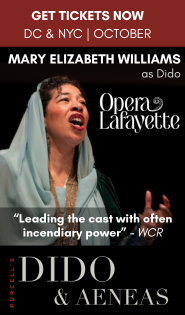
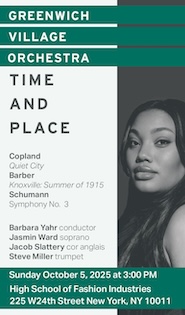
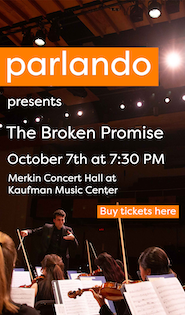

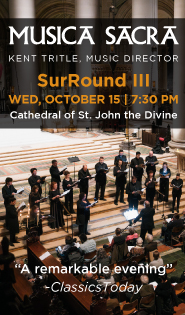

Posted May 09, 2019 at 6:51 pm by Saundra Maynard
I was so grateful to have been a part of the choir led by Courtney Carey. To God be the glory.